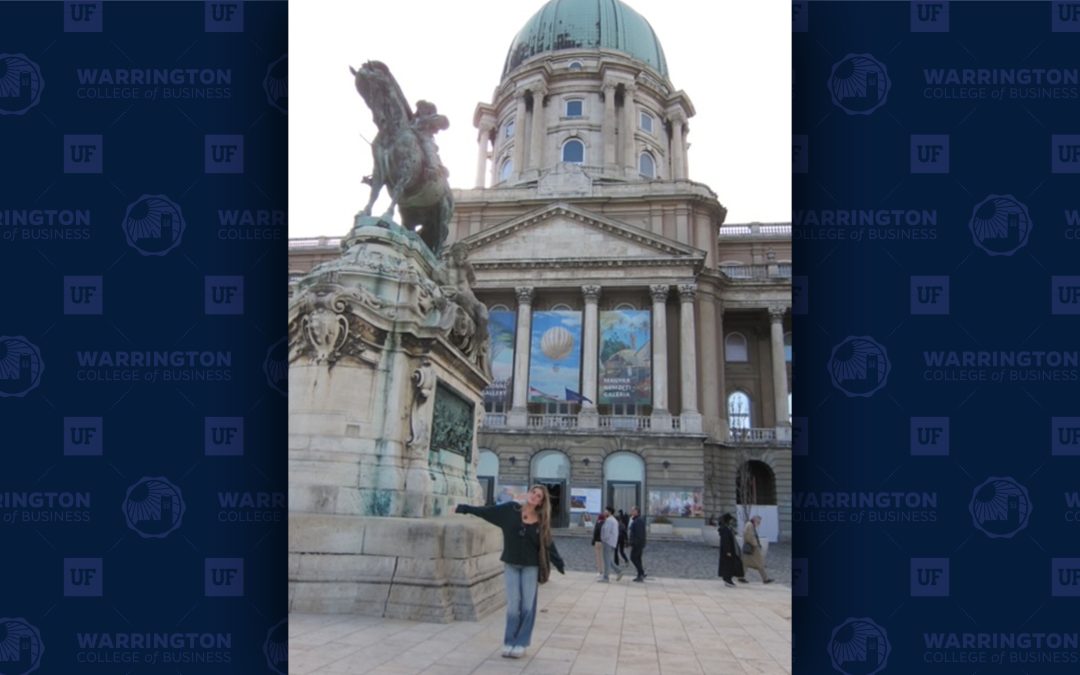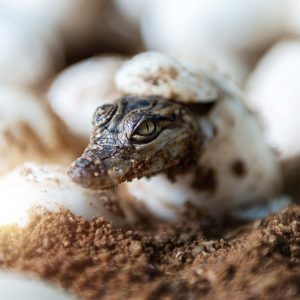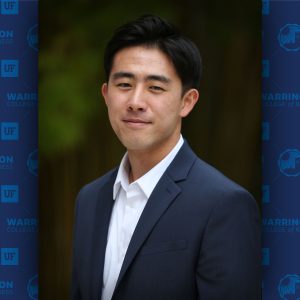MSM Student Spotlight: Mia Molinelli
Although a Global Immersion Experience (GIE) is not required in the Master of Science in Management (MSM) program, Mia Molinelli opted to gain international business experience as an elective. Read on to learn about her travels in Hungary.
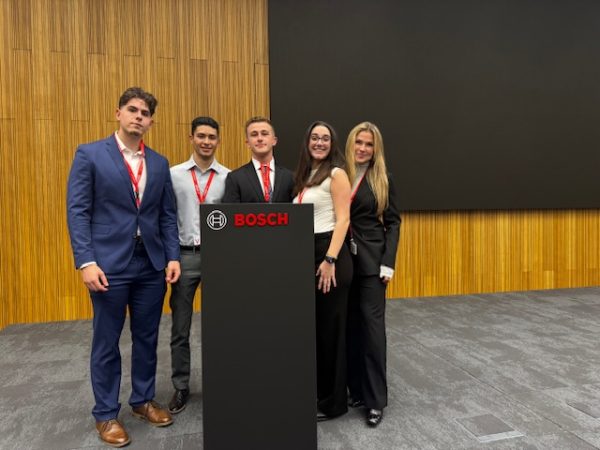
Mia Molinelli with her team at Bosch.
Q: Tell us about your Global Immersion Experience (GIE). Where did you go?
Molinelli: “During this trip, we were exposed to many different businesses in Hungary. We participated in events, such as panel discussions, where an executive from a venture capital firm, a nonprofit and a software development company spoke to us about the various struggles and challenges they currently face in the Hungarian business environment. We also visited various companies, such as Mol Group, which is the national oil distributor of Hungary, and Munch, a startup founded by a 20-year-old Hungarian with a passion for reducing food waste and improving global sustainability. I feel that the wide range of companies we interacted with and the experiences we were exposed to provided a well-rounded experience during this trip. We worked very closely with Bosch, the company we presented to at the end of the trip, and collaborating with a company whose headquarters are not in the United States provided unique business perspectives and challenges in adjusting our perceptions, ideas and cultural customs to be applicable in this new environment.”
Q: What was your most memorable experience during the trip?
Molinelli: “The most memorable experience I had during this trip was definitely my group’s visit to Buda Castle and the Hungarian National Gallery. After one of our company visits that took place earlier in the morning, we were given the afternoon to freely explore any part of Budapest we had not been able to visit up to that point in the trip. I’ve always had a passion for art, so I was incredibly excited to hike up what felt like about a million stairs to Buda Castle. Unbeknownst to me, the Hungarian National Gallery was located inside, and it was one of the most beautiful exhibits I have ever seen. It had multiple stories, with the very top floor allowing access to the dome, offering a breathtaking view of the entire city.”
Q: How did the trip impact your understanding of Hungarian culture and customs?
Molinelli: “I had previously had very little knowledge about Budapest or the country of Hungary itself, and even less about the specific customs and day-to-day lifestyle of its citizens, which starkly contrast with those in the United States. I found that many local citizens were often not very pleased with tourists and spent a lot of time staring to determine whether you were Hungarian or just a visitor. I found this pretty entertaining and felt satisfied when, towards the end of the trip, I received fewer stares, hopefully indicating that I was assimilating well. Since the city itself is very walkable, transportation is usually done on foot, which is quite different from the United States but an aspect I definitely enjoyed.”
Q: What challenges did you face during the trip, and how did you overcome them?
Molinelli: “Hungarian, as a language, is one of the most difficult I have ever encountered. I spent some time in Amsterdam last summer during my internship in London, and I found that Hungarian and Dutch are among the most different languages from English and the hardest to grasp. This made communication with locals who did not speak English very tricky. However, due to advanced technology and the various resources available, my team and I were able to overcome this challenge with just a little cooperation from both sides.”
Q: Did the trip change any preconceptions or stereotypes you had about the country or its people?
Molinelli: “Given that I had little background knowledge about Hungary before arriving, I didn’t have many preconceptions or stereotypes. However, I would say that the business landscape was incredibly developed, and it was refreshing to see their emphasis on sustainability and environmental concerns, even though their government and political situation are not as stable as in other countries. I also met several very kind Hungarian locals, which changed some of the stereotypes I had developed early in the trip when dealing with less approachable business owners and public workers.”
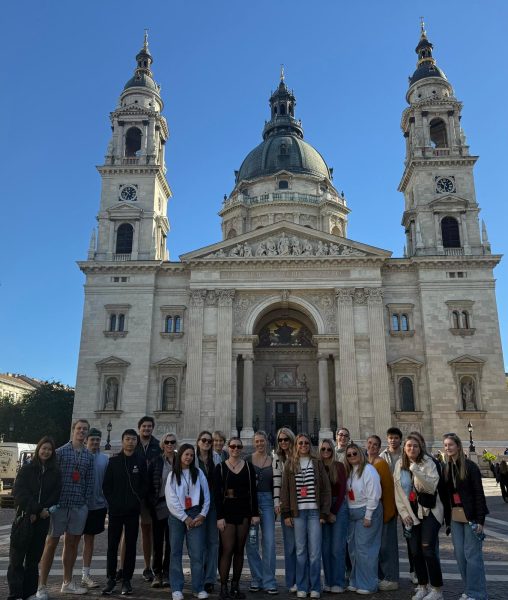
Mia Molinelli at St. Stephen’s Basilica in Budapest, Hungary.
Q: What skills or knowledge did you gain?
Molinelli: “One of the most valuable skills I gained on this trip was the development of my independence and confidence in international travel. Being comfortable in different and unique situations and navigating an environment where you either don’t speak the native language or are in a completely new place are skills that are incredibly important, not only in business but in life. This program allowed me to expand my experience in these types of environments and made me a more adaptable person overall. You can’t always control what happens to you, but you can always control how you react, and being placed in an international environment like this is the best way to practice this crucial principle.”
Q: How did the trip contribute to your personal growth or development?
Molinelli: “This trip really sparked my passion for history and culture that I sometimes forget about when I’m focused on school. I’ve always had an underlying interest in art and architecture, so being in this environment reminded me how much these aspects, which are not necessarily related to my studies, mean to me. I feel more confident and independent returning from this trip, and I also feel more well-rounded and eager to share what I’ve learned with those around me.”
Q: Would you recommend international experience to other MSM students?
Molinelli: “I would definitely recommend this opportunity to anyone who has the capability to participate. I have always had a passion for international travel, and getting to combine my academic interests with my personal interests is an opportunity for which I will always be grateful. An experience like this is unique and vastly different from a traditional elective; the benefits are incomparable. Additionally, the real-world experience and memories you make on a trip like this are beneficial not only for personal growth and development but can also be valuable in interview settings, demonstrating your adaptability and drive to experience new things.”


